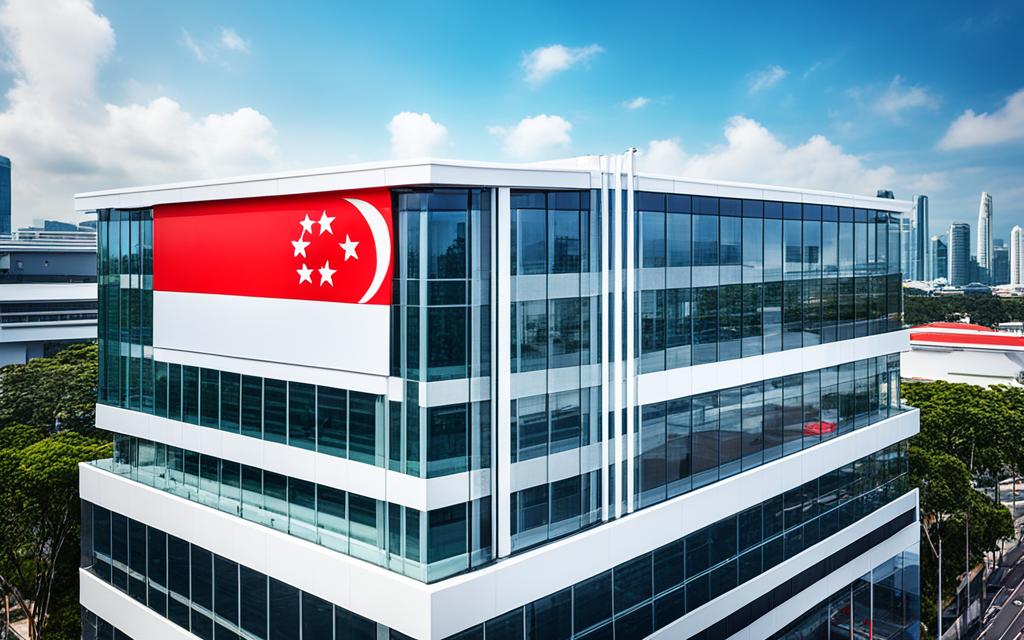Welcome to our comprehensive guide on opening a branch in Singapore. If you’re considering expanding your business into Asia’s dynamic marketplace, establishing a subsidiary in Singapore can offer numerous advantages. With its stable economy, pro-business environment, and robust legal framework, Singapore presents an attractive opportunity for companies looking to tap into the region’s growth potential.
In this article, we will walk you through the step-by-step process of opening a branch in Singapore. From understanding the benefits of choosing Singapore as your branch location to navigating the legal and regulatory requirements, we’ve got you covered. We will also delve into setting up your branch’s operations, managing compliance and reporting obligations, and strategies for growing and expanding your Singapore branch.
To begin, let’s explore why Singapore is an ideal choice for establishing your subsidiary.
Why Choose Singapore for your Branch?
If you’re considering expanding your business and establishing a presence in Asia’s dynamic marketplace, Singapore should be at the top of your list. With its stable economy, strategic location in Southeast Asia, pro-business environment, and robust legal framework, Singapore offers numerous advantages for companies looking to open a branch.
Firstly, Singapore’s economy has consistently demonstrated resilience and stability, making it an attractive destination for businesses. The country has a well-developed financial sector and strong trade links with major economies worldwide. These factors contribute to a business-friendly environment that supports growth and expansion.
Singapore’s strategic location serves as a gateway to the thriving economies of Asia. Situated at the crossroads of major shipping routes, the city-state provides easy access to the vast consumer markets in the region. This strategic advantage enables businesses to tap into Asia’s vast potential and leverage it for their growth.
Moreover, Singapore is known for its pro-business policies and regulations. The government actively supports entrepreneurship and innovation, offering various incentives and grants to help businesses succeed. The ease of doing business in Singapore is further enhanced by efficient infrastructure, reliable public services, and a skilled and diverse workforce.
In terms of the legal framework, Singapore boasts a robust and transparent legal system. The country upholds the rule of law and provides strong protection for intellectual property rights, ensuring that your company’s innovations and creations are secure. This level of legal certainty and protection greatly enhances business confidence and encourages investment.
Understanding Singapore’s Business Environment
In order to establish a successful branch or subsidiary in Singapore, it is crucial to have a comprehensive understanding of the country’s business environment. Singapore, known for its pro-business policies and strategic geographical location, offers numerous advantages for international companies.
Low Tax Rates
Singapore boasts a competitive tax system with low corporate tax rates. The headline corporate tax rate is currently set at 17%, making it one of the lowest in the region. Additionally, the country offers various tax incentives and exemptions to encourage foreign investment and attract global enterprises.
Extensive Network of Free Trade Agreements
Being a global trade hub, Singapore has established an extensive network of free trade agreements (FTAs) with countries around the world. These FTAs provide businesses with preferential access to numerous markets, reducing trade barriers and opening up opportunities for expansion.
Skilled Workforce
Singapore is renowned for its highly skilled and diverse workforce. The country prioritizes education and invests heavily in developing a talented labor pool. Businesses benefit from a well-educated workforce proficient in multiple languages, fostering a competitive advantage in the global market.
Strong Intellectual Property Protection
Intellectual property protection is crucial for businesses operating in technologically advanced sectors. Singapore is committed to safeguarding intellectual property rights and has established robust legal frameworks to protect trademarks, copyrights, patents, and trade secrets. This ensures that businesses can confidently develop and commercialize their innovations without fear of infringement.
Understanding Singapore’s business environment is vital for any company considering the establishment of a branch or subsidiary in the country. With its low tax rates, extensive network of free trade agreements, skilled workforce, and strong intellectual property protection, Singapore presents a favorable environment for business growth and success.
Legal and Regulatory Requirements for Opening a Singapore Branch
Opening a branch in Singapore requires compliance with specific legal and regulatory requirements. It is important to ensure that you adhere to these obligations to establish your Singapore branch successfully.
Company Registration
The first step in setting up a branch in Singapore is company registration. You must register your branch as a foreign company with the Accounting and Corporate Regulatory Authority (ACRA). This process involves providing necessary documents, such as the parent company’s constitution, certificate of incorporation, and details of directors and shareholders.
Corporate Governance
After registration, you must comply with corporate governance regulations in Singapore. This includes appointing a local resident director who must be a Singapore citizen, permanent resident, or holder of an Employment Pass or EntrePass. Additionally, you will need to maintain proper books of accounts and hold annual general meetings.
Compliance Obligations
As a Singapore branch, you must adhere to various compliance obligations. These include filing annual returns with ACRA, submitting audited financial statements, and complying with the Singapore Companies Act. It is crucial to stay updated with changes in legislation and ensure timely compliance to avoid penalties or legal issues.
Obtaining Necessary Licenses
In certain industries, obtaining licenses or permits is a prerequisite for operating a branch in Singapore. For example, financial institutions may require licenses from the Monetary Authority of Singapore (MAS). Research the specific licenses applicable to your industry and ensure you meet the requirements before commencing operations.
By fulfilling the legal and regulatory requirements, you can establish a compliant and legally recognized presence for your subsidiary in Singapore. This ensures that your operations are conducted within the bounds of the law, safeguarding your business and enabling you to focus on growth and development.
Setting Up Your Branch’s Operations in Singapore
Once you have successfully registered your Singapore branch, it’s time to set up its operations. This section will guide you through the necessary steps to ensure a smooth and efficient process.
Choosing the Right Office Space
One of the first considerations is selecting a suitable office space for your branch. Singapore offers a wide range of options, from serviced offices to commercial buildings. It’s important to assess your specific business needs, such as location, size, accessibility, and amenities, to find the ideal space that aligns with your objectives.
Hiring Local Staff
Building a strong team is crucial to the success of your branch. Singapore has a highly skilled and diverse workforce, making it an excellent pool of talent to tap into. Attracting and retaining top local talent requires a strategic approach, including competitive remuneration packages, training and development opportunities, and a positive work culture.
Navigating Employment Regulations
As an employer in Singapore, it’s important to familiarize yourself with the country’s employment regulations. This includes understanding the Employment Act, which covers key aspects such as working hours, leave entitlements, and employee benefits. Compliance with these regulations is essential to maintain a healthy and legally sound work environment.
Setting Up Bank Accounts
Establishing local bank accounts is essential for smooth financial operations. Singapore has a robust banking sector that offers a wide range of services tailored to businesses. Research various banks to find the most suitable partner for your branch and ensure you have the necessary documentation and information to open the accounts.
By carefully considering these factors and following the steps outlined in this section, you can ensure a successful setup of your branch’s operations in Singapore.
Taxation and Incentives for Singapore Branches
When establishing a Singapore branch or subsidiary, it is important to understand the tax implications and incentives that may apply to your business. Singapore offers an attractive tax environment for companies, making it a favorable location for expanding operations in Asia.
Corporate tax rates in Singapore are competitive, currently standing at a flat rate of 17%. This rate is applicable to both local and foreign companies, ensuring a level playing field for businesses operating in the country. The Singapore government has also implemented various tax incentive schemes to encourage foreign investment and promote economic growth.
One notable tax incentive is the Development and Expansion Incentive (DEI), which provides tax relief for companies that undertake qualifying activities in high-growth sectors. This incentive aims to attract businesses in emerging industries such as technology, research and development, and innovation.
Another important aspect to consider is withholding tax. Singapore has an extensive network of Avoidance of Double Taxation Agreements (DTAs) with over 80 countries, including key global economies. These DTAs help to prevent double taxation of income earned by your Singapore branch or subsidiary. By leveraging these agreements, companies can minimize their tax liabilities and maximize profits.
Additionally, businesses operating in Singapore need to be aware of the Goods and Services Tax (GST). GST is a consumption tax levied on the supply of goods and services in Singapore and currently stands at 7%. It is important for companies to understand their GST obligations and comply with the reporting and filing requirements to avoid penalties.
Transfer pricing regulations are also relevant for Singapore branches. Transfer pricing refers to the pricing of transactions between related entities, such as the transfer of goods, services, or intellectual property rights. Singapore has implemented transfer pricing guidelines that align with international standards, ensuring fair and arm’s length pricing for transactions between related parties.
To summarize, when establishing a Singapore branch, it is essential to consider the corporate tax rates, tax incentives, withholding tax agreements, GST obligations, and transfer pricing regulations. By proactively managing your tax obligations and leveraging available incentives, you can optimize your business’s financial performance and position it for sustainable growth in Asia’s dynamic marketplace.
Managing Compliance and Reporting Obligations
Operating a branch in Singapore comes with certain compliance and reporting obligations that businesses need to be aware of. Failing to meet these requirements can result in penalties and legal consequences. In this section, we will guide you through the essential obligations you need to manage for your Singapore Branch.
Annual Filings
As a Singapore Branch, you are required to file your annual financial statements and reports with the relevant authorities. This includes submitting your audited financial statements, director’s reports, and tax returns. These filings must be prepared in compliance with the Singapore Financial Reporting Standards and the Companies Act.
Audits and Ongoing Reporting
Similar to local companies, Singapore Branches must appoint an auditor to conduct annual audits of their financial statements. The auditor will review the branch’s financial records and ensure compliance with financial regulations. Additionally, you will be responsible for ongoing reporting to regulatory authorities, such as the Accounting and Corporate Regulatory Authority (ACRA) and the Inland Revenue Authority of Singapore (IRAS).
Compliance Obligations
Singapore has strict compliance regulations in place to maintain transparency and integrity in business operations. Your branch will need to comply with various obligations, including meeting statutory requirements for record-keeping, maintaining proper books of accounts, and adhering to corporate governance regulations.
Fulfilling Reporting Requirements
In addition to the annual filings, your Singapore Branch may be required to submit regulatory reports to authorities such as the Monetary Authority of Singapore (MAS) or the Singapore Exchange (SGX), depending on your industry and nature of business activities.
- For financial institutions, compliance with MAS regulations will be crucial.
- For publicly listed companies, you will need to comply with SGX reporting requirements.
Penalties and Consequences
Failure to meet compliance and reporting obligations can result in penalties, fines, or legal actions. It is crucial to stay updated with the latest regulatory changes and ensure timely and accurate filings to avoid any negative repercussions for your Singapore Branch.
By managing the compliance and reporting obligations effectively, your Singapore Branch can maintain its reputation, uphold legal requirements, and operate smoothly in the dynamic business environment of Singapore.
Growing and Expanding Your Singapore Branch
Once you have successfully established your Singapore branch or subsidiary, it’s time to focus on growth and expansion. Singapore offers numerous opportunities for businesses to thrive in its dynamic marketplace. Here are some strategies to consider:
Market Penetration: To capture a larger market share, it’s essential to understand your target audience and develop effective marketing strategies. Conduct market research to identify customer needs and preferences. Tailor your products or services to meet those demands, and implement targeted marketing campaigns to reach potential customers.
Partnerships: Collaborating with local businesses can help you tap into existing networks and gain access to a wider customer base. Look for strategic partnerships with companies that complement your offerings. This can lead to shared resources, enhanced market visibility, and increased brand recognition.
Mergers and Acquisitions: An alternative way to expand your Singapore branch is through mergers or acquisitions. Consider acquiring complementary businesses or merging with competitors. This strategy can provide access to new markets, technologies, and expertise, enabling rapid expansion and increased market share.
Accessing Funding and Grants: Singapore offers a range of funding and grant programs to support business growth and innovation. Explore options such as government grants, venture capital, angel investors, and crowdfunding platforms. These financial resources can provide the necessary capital for research and development, expansion initiatives, and talent acquisition.
By implementing these strategies, you can position your Singapore branch for continued growth and success in this thriving business hub.
















